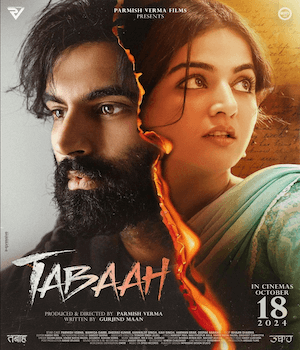Parmish Verma Interview Tabaah (Part 1)

Rupinder Rainer had the opportunity to catch up with Parmish Verma to talk about his upcoming movie Tabaah.
Welcome Parmish Verma to Simplybhangra.com. Firstly, congratulations on the release of your new film, which is releasing next week.
Thank you, thank you for having me.
Having a look at the trailer for this film, it's quite different to the other Punjabi films. Even your first film with Rocky Mental, that was quite different. And now Tabaah. Where did you get the idea of this film from?
The script came to me, so the idea wasn't mine. But I was certain that I wanted to do something like this. I wanted to do a character which was unlike Parmish. I felt the roles that I was being offered, they were basically the same role, but just a different name. And, there was different variations of the same character.
I understand that's how industry works, because once you become successful in a certain genre, people want to make similar style, to make money, because that's what people like. But as an actor, I felt that I'm selling myself short. I haven't fully showcased my talent. You know, there's more to an actor than just playing a romantic comedy or action role.
So this, I felt as an actor, it was a different genre. This was a different character. Ambar is somebody who's very unlike Parmish. I wouldn't deal with heartbreak or tragedy the same way Ambar did. So as an actor, that was the challenge. I really enjoyed performing someone who I couldn't resonate with.
Some might say that's quite similar to the movie Kabir Singh, the Bollywood movie. What would you like to say about that?
That it's not. Only because drinking and smoking in our film is a coping mechanism. This film isn't about drinking alcohol or this isn't about smoking cigarettes. I feel in Kabir Singh, the Kabir Singh character had an opportunity to vent out his anger. But Ambar, on the other hand, is simmering in his own sorrow. So every heartbreak is different.
Drinking and smoking is just plain coping mechanism. Even if I wanted to copy a film, I wouldn't go for something that big, that successful. It just came out two years ago. So, I knew this from the very first day, the first day we posted the poster. We knew that people would think this is Kabir Singh simply because it was a shot of smoking and drinking. But that's a conscious call that you take as an actor, as a producer and as a director.
In your role, you changed your physical appearance quite a bit, so what did you have to do to get into that shape?
I just had to eat a lot and not train. It was ideal. It's just that again, it shows my commitment and it shows how driven I was to play someone who was unlike me. To play a character which had more detail and actually show the trauma that this character has been through.
This film isn't about drinking or smoking or losing weight. That's where I'm getting to. This film is about that individual's emotions. It's about his sorrow, it's about his grief. And the putting on the weight, drinking alcohol, everything just came with it.
Did you have to stay away from the gym for a while?
Yeah, that was the hardest. If I ate more and kept training, then I would just gain size. I'd still be fat, I'd still put on some fat. But the muscles wouldn't stop pumping if I was training every day. So I wanted to show how this individual deteriorated by drinking alcohol. I had to stop training so my arms, my shoulders deformed from their original shape. T
hat was hard because you're taking 3-4 months off training for somebody who's always trained. It was just annoying. Because you don't fully feel awake when you're not training. You just need a lot of caffeine in order for your body to feel that you're fully energized. And with all that more weight added to your body, you feel more lethargic. The way you stand, the way you walk, everything's affected. Your breathing isn't the same. But that's what we needed for Amber.
Because in order to perform differently than what I've done before, I needed a different breathing pattern. I needed a different speaking pattern. And that all changed automatically when I put on the weight.
You probably needed a new wardrobe as well.
So the good thing about Tabaah was that I produced it. So what I did was, I found a lot of clothes that were worn by my friends or my dad. They were old clothes that I







